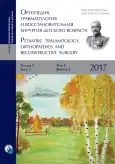Ребенок-инвалид и общество: Взаимоотношения и социализация
- Авторы: Хубулава Г.Г.1
-
Учреждения:
- ФГБУ «НИДОИ им. Г.И. Турнера» Минздрава России
- Выпуск: Том 5, № 3 (2017)
- Страницы: 66-73
- Раздел: Статьи
- URL: https://bakhtiniada.ru/turner/article/view/7071
- DOI: https://doi.org/10.17816/PTORS5368-73
- ID: 7071
Цитировать
Аннотация
Актуальность. Проблема детской инвалидности остается одной из самых острых социальных проблем. Наряду с вопросом о социальном статусе инвалида и амбивалентностью самого термина «инвалид», которому современный социум предпочитает определение «человек с ограниченными возможностями», возникает вопрос о способе социализации детей-инвалидов.
Цель — анализ взаимоотношений инвалида и общества в истории культуры и рассмотрение проблемы социализации детей-инвалидов и некоторых способов и методов такой социализации.
Методом исследования выступает анализ взаимоотношений общества и детей-инвалидов, а также методов и способов социально-психологической реабилитации таких детей, предпринятый в терминах философской антропологии.
Результаты и обсуждение. Цель социализации ребенка-инвалида, проходящей в его семье, активно взаимодействующей с коллективом врачей, не просто научить его адаптироваться к условиям социума и быть ему полезным, а, насколько это возможно, помочь ему превратиться из изгоя и исключения в человека, осознающего себя как минимум равным окружающим, в человека, сознающего свое достоинство и несомненную ценность.
Заключение. В процессе социально-психологической реабилитации ребенка-инвалида кроме него самого и медицинского сообщества принимает активное участие и семья, ближайшее окружение ребенка. Успех реабилитации в значительной степени зависит от их взаимодействия. Какие бы методы реабилитации мы ни использовали — будь то игровые методы, параспорт, практика «смешанных» школ или домашнее образование, мы не должны забывать, что перед нами личность со своими талантами, проблемами и нуждами.
Ключевые слова
Полный текст
Открыть статью на сайте журналаОб авторах
Григорий Геннадьевич Хубулава
ФГБУ «НИДОИ им. Г.И. Турнера» Минздрава России
Автор, ответственный за переписку.
Email: g.hubulawa@yandex.ru
д-р филос. наук, научный сотрудник учебно-методического отдела
Россия, 196603, г. Санкт-Петербург, г. Пушкин, ул. Парковая, дом 64-68Список литературы
- Обухова Л.Ф. Детская психология: теории, факты, проблемы. – М.: Тривола, 1995. – 362 с. [Obukhova LF. Detskaya psikhologiya: teorii, fakty, problemy. Moscow: Trivola, 1995. 362 p. (In Russ.)]
- Бонхоффер Д. Жить вместе. – М.: Триада, 2000. – 446 с. [Bonkhoffer D. Zhit’ vmeste. Moscow: Triada; 2000. 446 p. (In Russ.)]
- Иов, 1 : 21. [Iov, 1 : 21. (In Russ.)]
- Дворецкий И.Х. Латинско-русский словарь. – 552 с. [Dvoretskii IKh. Latinsko-russkii slovar’. 552 p. (In Russ.)]
- Достоевский Ф.М. Идиот. – М., 2006. – 236 с. [Dostoevskii FM. Idiot. Moscow; 2006. 236 p. (In Russ.)]
- Treves F. The Elephant Man and Other Reminiscences. London; 1923.
- Скульптор Марк Куин (Marc Quinn). [Skul’ptor Mark Kuin (Marc Quinn). (In Russ.)] См. http://ibigdan.livejournal.com/8561845.html.
- Гальего Рубен Давид Гонсалес. Белое на черном. – М.: Лимбус Пресс, 2005. – 224 с. [Gal’ego Ruben David Gonsales. Beloe na chernom. Moscow: Limbus Press; 2005. 224 p. (In Russ.)]
- Гальего Рубен Давид Гонсалес. Я сижу на берегу. – М.: Лимбус Пресс, 2005. – 360 с. [Gal’ego Ruben David Gonsales. Ya sizhu na beregu. Moscow: Limbus Press; 2005. 360 p. (In Russ.)]
- Петросян Мариам. Дом, в котором… (иллюстрированное издание). – М.: Гаятри / Livebook, 2017. – 968 с. [Petrosyan Mariam. Dom, v kotorom (illyustrirovannoe izdanie). Moscow: Gayatri / Livebook; 2017. 968 p. (In Russ.)]
- Кулагина Е.В. Образование детей-инвалидов и детей с ограниченными возможностями здоровья: социально-экономический аспект. – М.: ООО «Деловые и юридические услуги “ЛексПраксис”», 2014. – 206 с. [Kulagina EV. Obrazovanie detei-invalidov i detei s ogranichennymi vozmozhnostyami zdorov’ya: sotsial’no-ekonomicheskii aspekt. Moscow: Delovye i yuridicheskie uslugi “LeksPraksis”; 2014. 206 p. (In Russ.)]
- Полоухина Е.А. Особенности семейного микроклимата в семьях с детьми-инвалидами // Вестник СПбГУ. – 2008. – Вып. 3. Серия 12. – С. 143–148. [Poloukhina EA. Osobennosti semeinogo mikroklimata v sem’yakh s det’mi-invalidami. Vestnik SPbGU. 2008;12(3):143-148. (In Russ.)]
- Богданова М.А. Институт Спорта: социокультурная динамика. – Ростов н/Д: Южный федеральный университет, 2013. – 341 с. [Bogdanova MA. Institut Sporta: sotsiokul’turnaya dinamika. Rostov-na-Donu: Yuzhnyi federal’nyi universitet; 2013. 341 p. (In Russ.)]
Дополнительные файлы







